DIY Matcha Latte Recipe
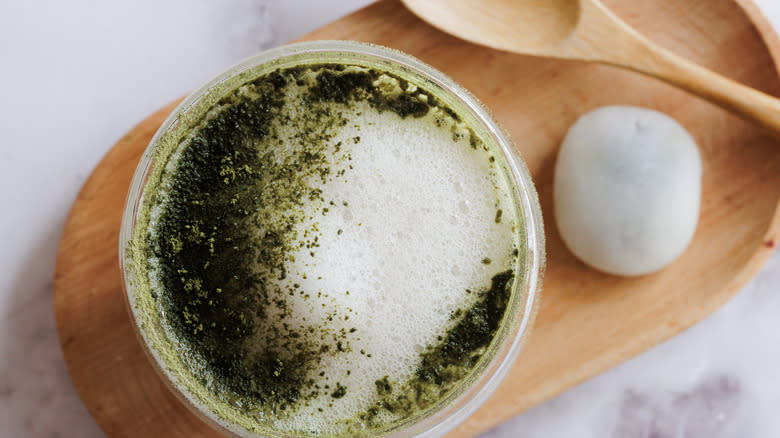
If you are a tea aficionado, at some point in your life you have probably watched Japanese tea ceremonies. A seemingly simple act -- brewing a cup of tea -- becomes a true ritual of dedication and meditation. With this recipe, you'll have the tools to make a real cup of matcha at home. This DIY matcha latte is a creamy, smooth, bitter, and sweet concoction that might change how you approach your morning coffee habit. Once you give this age-old method a try, you'll never need to pay for another mediocre matcha latte again.
The most important step is to mix the matcha powder into a smooth paste with some hot water, and the traditional tool for the job is a small bamboo whisk. For the best matcha latte, keep your wrist flexible while whisking the matcha powder with the water. You can turn your bamboo whisk in a soft circular motion for a silky texture, or in a quick M or W pattern for a frothy texture. For those who don't have a bamboo whisk at home, a small regular kitchen whisk would work in a pinch. With this simple recipe, if you take a bit of care with each step you will be rewarded with a perfect matcha latte.
Read more: 15 Boba Flavors, Ranked Worst To Best
Gather The Ingredients For This Matcha Latte
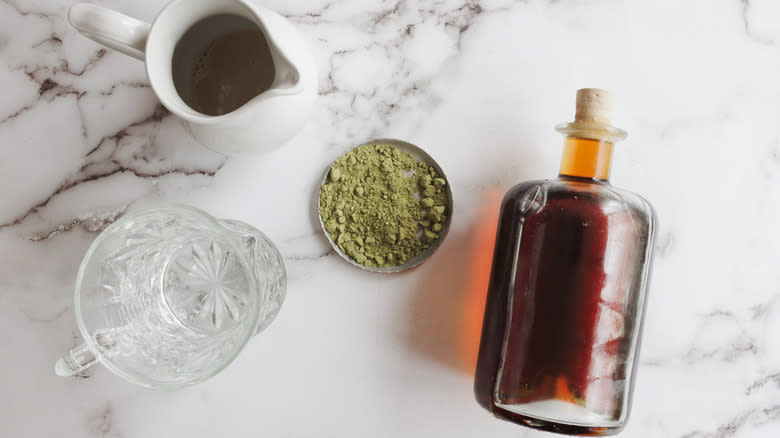
To make a frothy matcha latte, you will need only a few ingredients: matcha fine powdered green tea, water, milk, a bit of sweetener -- we recommend maple syrup -- and a few tools including a sifter, whisk, saucepan, and frother.
Step 1: Sift The Matcha Powder
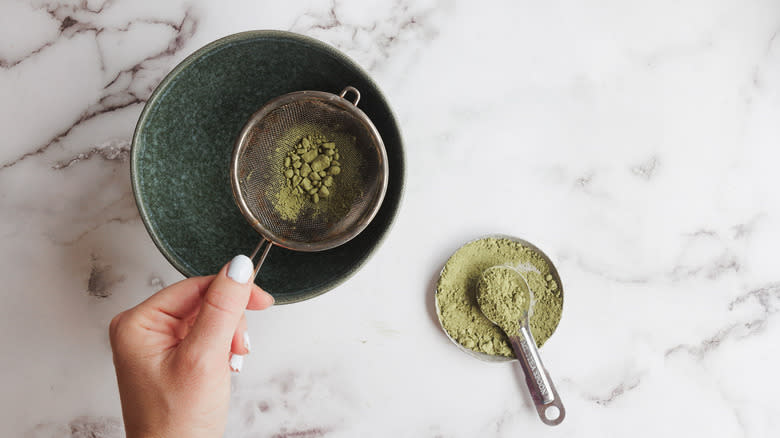
Sift matcha powder through a strainer into a bowl to remove lumps.
Step 2: Let The Boiling Water Cool
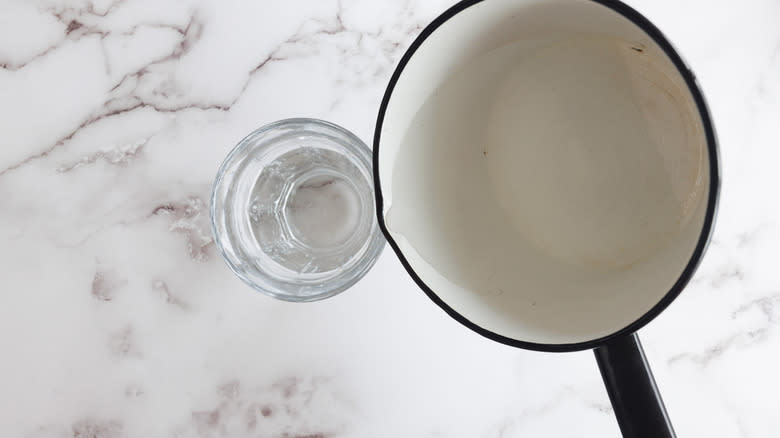
Pour boiling water into another cup. Let it cool for 1 minute until it is about 180-190 F.
Step 3: Add Water To The Matcha Powder
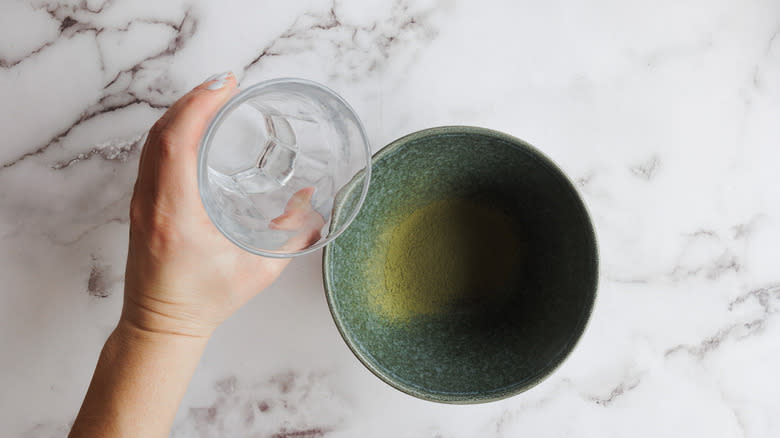
Slowly pour the water into the bowl with the matcha powder.
Step 4: Whisk The Water And Matcha Powder
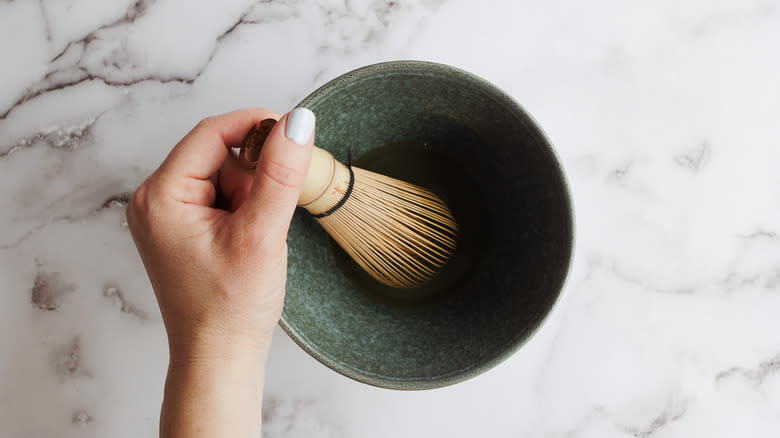
Using your bamboo matcha whisk, whisk for 10–15 seconds until the tea turns a vibrant green.
Step 5: Steam The Milk
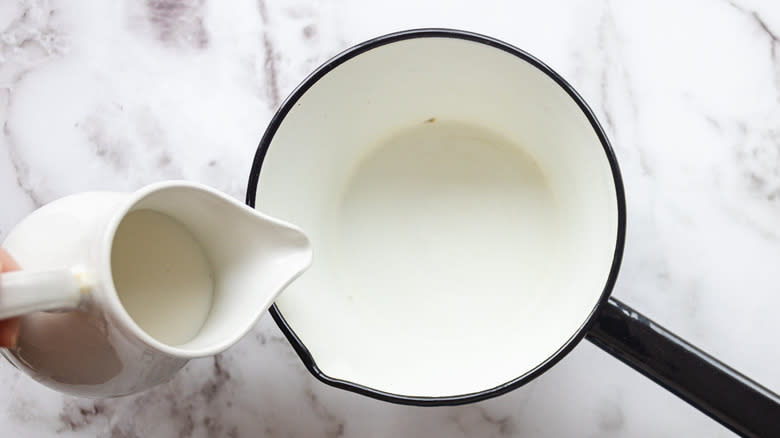
In a separate saucepan, heat the milk until steaming, about 3-5 minutes.
Step 6: Sweeten The Milk
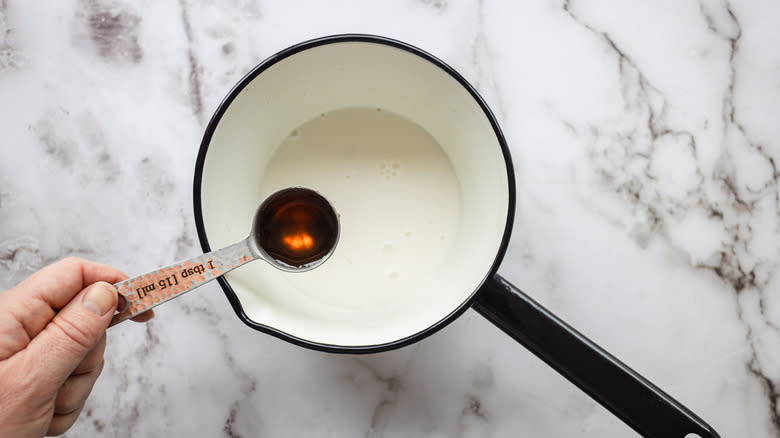
Stir in the maple syrup.
Step 7: Froth The Milk
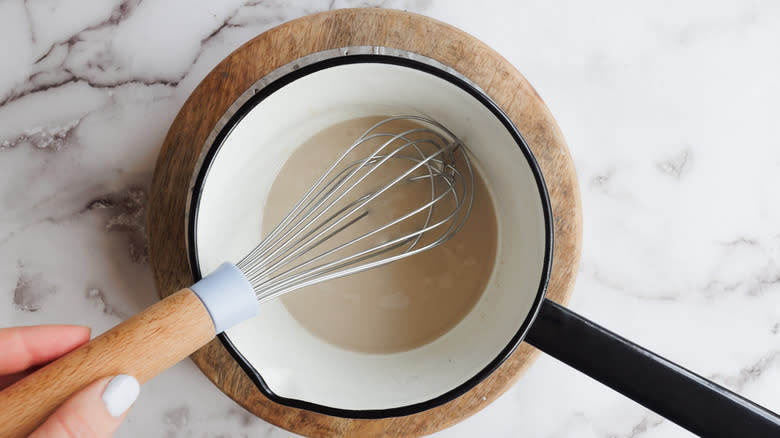
Froth the sweetened milk with a frother or whisk until it's airy and foamy.
Step 8: Combine The Matcha And Milk
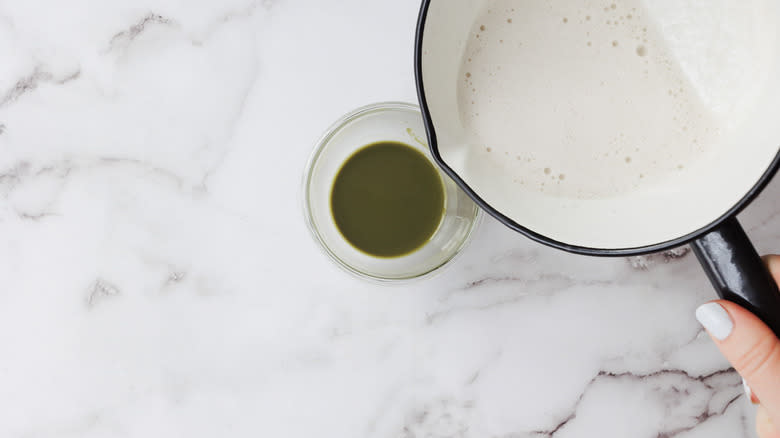
Pour the matcha from the bowl into a cup, and then add the steamed milk.
Step 9: Serve The Matcha Latte
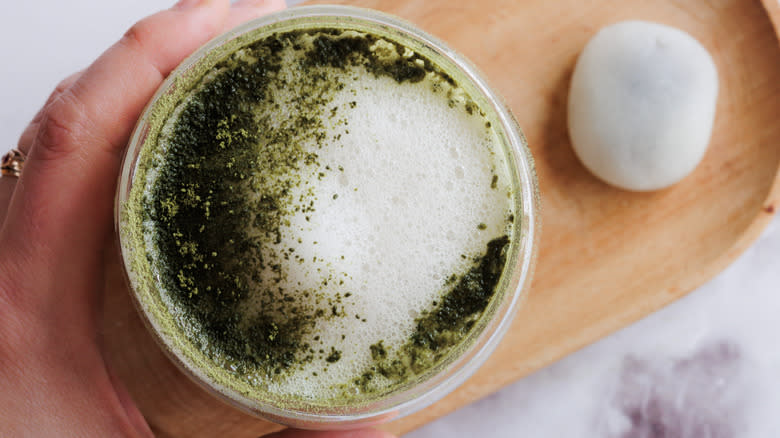
Serve your matcha latte immediately, optionally dusting with a pinch of matcha powder on top.
What Type Of Matcha Powder Should I Use?
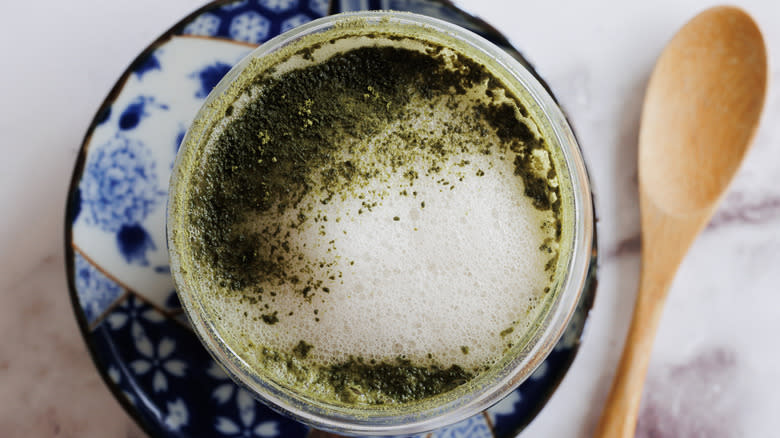
Because we're adding milk to the matcha to make this latte, you'll want the tea itself to have a stronger flavor. When choosing matcha powder for lattes or for cooking and baking, use a culinary-grade matcha rather than a ceremonial grade. Culinary-grade matcha is made from younger green tea leaves and has a more robust, vegetal, and bitter flavor that works well in lattes, smoothies, baked goods, and other applications. The flavor has hints of spinach and grass that hold their own when mixed with other ingredients.
Ceremonial-grade matcha is made from older leaves and has a more delicate, subtly sweet flavor that is meant to be appreciated on its own. It is too light to stand up to heating, mixing, and blending in recipes. Ceremonial grade is best reserved for traditional Japanese tea ceremonies. For cooking, opt for an affordable culinary-grade powder that provides vibrant color and bolsters the flavor of the dish. When buying the best matcha, look for a powder that has a fine consistency without clumps or stems.
Can I Use A Different Milk To Make This Matcha Latte?
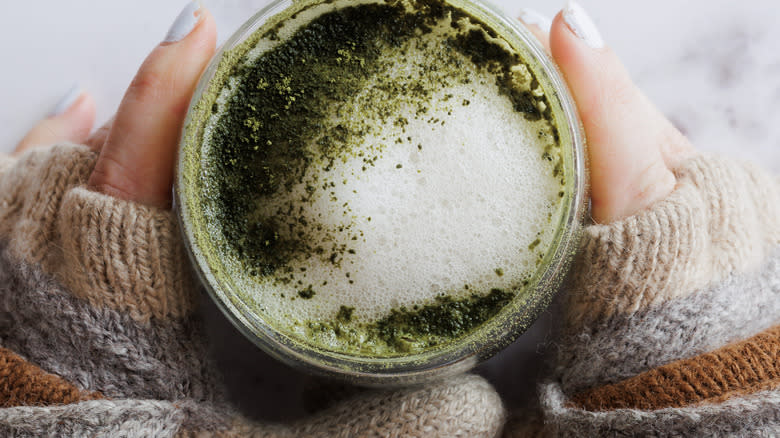
You can choose whatever milk you'd like for a matcha latte, but it will have a big effect on the taste. For a creamy, rich latte, dairy milk -- either whole milk or 2% milk -- works very well. We don't recommend skim milk since the low fat content won't give you the right frothy consistency. The higher fat content gives the latte a smooth, velvety feel.
For a vegan version of matcha latte, you can use non-dairy milk such as unsweetened soy, almond, oat, or coconut. Oat and coconut milk, in particular, make the latte extra creamy. Just be sure to avoid non-dairy milk with added flavors or sweeteners, as you want the real matcha flavor to shine through. Whichever milk you choose, take care not to boil it. Heating the milk to too high a temperature can give it an unpleasant cooked taste, and might overpower the flavor of the matcha. You want to gently heat it until it's steaming and small bubbles start forming around the edges -- between 160-180 F is ideal.
How Do I Make The Matcha Latte Frothy?
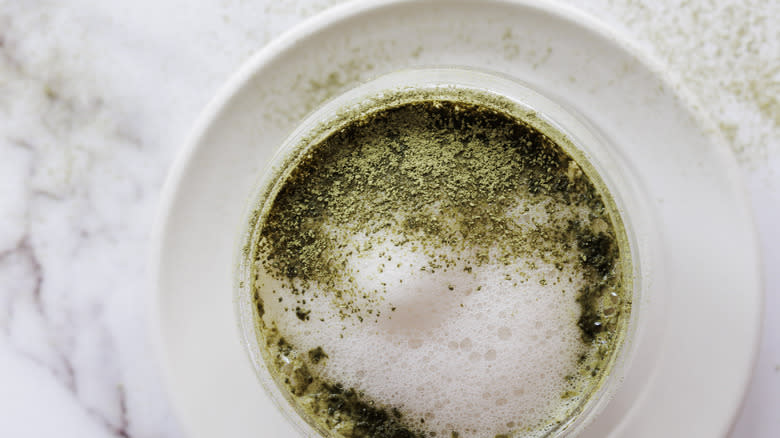
A frothy, foamy texture is what used to set a latte from a coffee shop apart from those made by home cooks. With advances in household coffee gadgets, truly anyone can make a good foamy latte. The key to achieving this froth is to aerate the heated milk before combining it with the matcha. To achieve this effect, you can use a milk frother or immersion blender. You can also use a French press coffee maker. Just pour the milk into a clean coffee maker, remembering that it will increase in size as the milk gets frothy, and pump the plunger through it until you achieve your desired frothiness.
If you don't have any of these gadgets, you can also whisk vigorously to incorporate air into the hot milk. The more you can whip and swirl air into the milk, the lighter and frothier it will become. Beat the milk until it doubles in volume and becomes light, foamy, and creamy on top. When you combine frothed milk with the bright green matcha you get a layered latte with contrasting colors and textures. A sprinkle of powdered matcha on top completes the effect.
DIY Matcha Latte Recipe
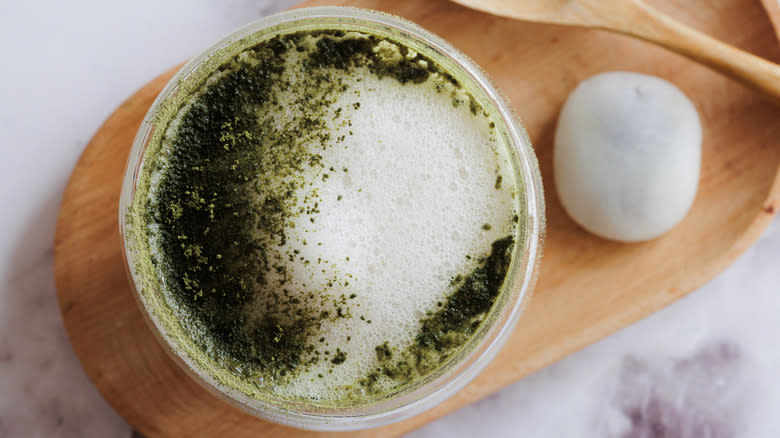
Prep Time: 5mCook Time: 5mYield: 1 ServingIngredients
1 ? teaspoons matcha powder
2 tablespoons boiling water
? cup milk
1 tablespoon maple syrup
Directions
Sift matcha powder through a strainer into a bowl to remove lumps.
Pour boiling water into another cup. Let it cool for 1 minute until it is about 180–190 F.
Slowly pour the water into the bowl with the matcha powder.
Using your bamboo matcha whisk, whisk for 10–15 seconds until the tea turns a vibrant green.
In a separate saucepan, heat the milk until steaming, about 3-5 minutes.
Stir in the maple syrup.
Froth the sweetened milk with a frother or whisk until it's airy and foamy.
Pour the matcha from the bowl into a cup, and then add the steamed milk.
Serve your matcha latte immediately, optionally dusting with a pinch of matcha powder on top.
Read the original article on Tasting Table.
